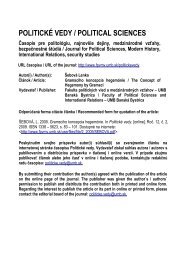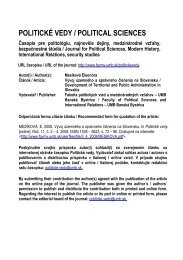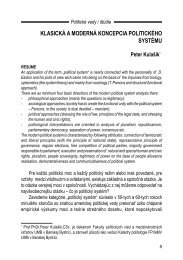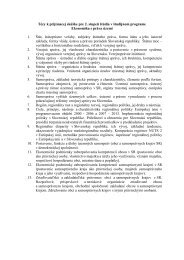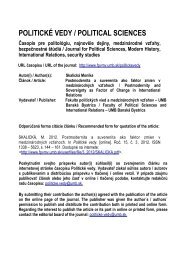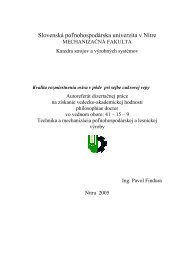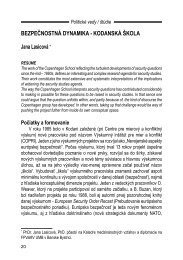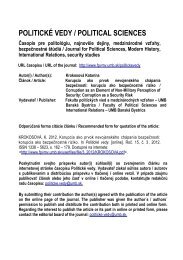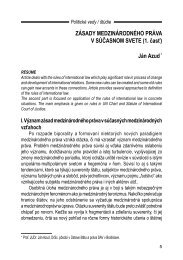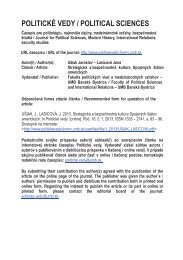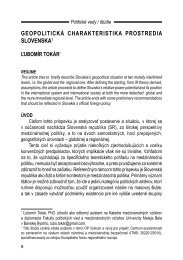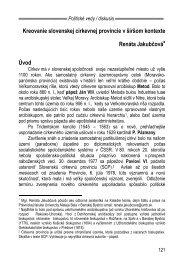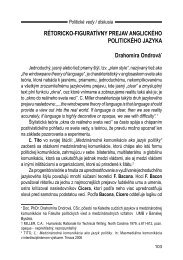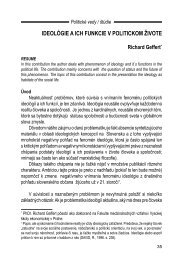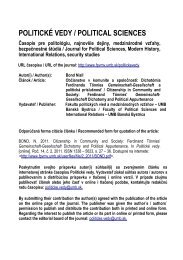MRAVNÃ VÃCHOVA V Å KOLÃCH NA SLOVENSKU A V ZAHRANI ÄÃ
MRAVNÃ VÃCHOVA V Å KOLÃCH NA SLOVENSKU A V ZAHRANI ÄÃ
MRAVNÃ VÃCHOVA V Å KOLÃCH NA SLOVENSKU A V ZAHRANI ÄÃ
Create successful ePaper yourself
Turn your PDF publications into a flip-book with our unique Google optimized e-Paper software.
models in individual categories of European regions, where the regions of Scandinavia, western<br />
Europe and partially some countries of south-western, southern and central Europe show particularly<br />
progressive connotations. (KORIM, V.: 2008, s. 10 et seq.)<br />
Concerning this there has been some progress made in Slovakia. Modern tendencies in formation of<br />
ethical education teachers´ personalities are positively reflected in the educational process. During<br />
their educational activities teachers perform series of practical exercises that are connected with group<br />
reflection and individual self-reflection in such basic areas like communication, empathy,<br />
assertiveness, positive self-assessment and assessment of others, pro-social behaviour and its forms in<br />
particular situations and the like. Under the influence of emphasizing new educational procedures plus<br />
foreign literature, teachers adopted to a large degree mainly the methods of active learning and<br />
learning through experience, playing of roles or methods of drama. While, for example, until 1993<br />
there were 300 qualified teachers out of 7000 ethical education teachers, in the next 5 years<br />
methodological centres in Slovakia prepared more than 4000 teachers and nowadays the number has<br />
risen to more than 5500 teachers. (VALICA, M.: 2007, s. 27)<br />
In spite of these positive figures, it is still being criticised that according to the Ministry of Education<br />
guidelines of May 2004, ethical education on the 1 st grade of primary schools should be taught by<br />
teachers who by September 1, 2004 will have only attended a one-day course and later gradually by<br />
September 1, 2007 they will have attended continuous courses on ethical education in the extent of 80<br />
hours. At the same time, the qualification requirements of religion teachers were standardized, i.e.<br />
stricter. The fact that there were no ethical education course books, although the Ministry provided for<br />
the distribution of religion course books for the 1 st grade of primary schools in 2004/2005, was also a<br />
demonstration of depreciation of ethical education. What is more, according to the Institute of<br />
Information and Prognosis of Education, teachers with majors religion – ethical education dominated<br />
the structure of qualified ethical education and religion teachers at primary schools in 2001 and 2005.<br />
Thus religion teachers who teach also ethical education can find the alternative teaching of ethical<br />
education in contrast with their beliefs.<br />
The personal level of educational process is not sufficiently developed in current documents or actual<br />
school practice and yet the outcome of the personalisation should be a mature complex personality of<br />
the educated with a developed sense of self-recognition, its own teleological orientation (aims, plans),<br />
pronounced opinions and certain knowledge and skills in order to be able to act in real life in terms of<br />
its opinions, aims and knowledge. That is the reason why the issues of personalisation development<br />
should be involved in the contents and time continuity to the same extent as the pro-social education.<br />
Over-enthusiastic pro-sociality can be in certain life situations demonstrated as unjustified loyalty to<br />
deficits and faults of sociality, social politics and even to misunderstanding of the whole social area of<br />
the society.<br />
Our preliminary findings based on leading experts´ statements refer to the absence of several basic<br />
educational means in the ethical education concept, such as self-regulation (regulation of person´s self<br />
and behaviour), self-control, self-direction, which is closely connected with inner as well as outer<br />
discipline. According to professor Miron Zelina, there is lack of psychosocial training that could be<br />
applied to topics, such as family, environment, marriage, parenthood etc. In his opinion, we should<br />
refer to Kohlberg and other authors who determined the moral development hierarchy. He emphasizes<br />
the self-regulation of the educated that must be based on knowledge, discipline, demands and<br />
motivation. The trainings on lessons should focus on the self-regulation in critical situations. Ethical<br />
education should not adopt the character of another “school subject” but it must be an experiencebased<br />
subject. However, this experience should not only be reduced to fun or unproductive games.<br />
Impersonal and unsubjective attitudes to pupils and their understanding only as objects of education<br />
are contra productive and should not be a part of ethical education.<br />
We are aware of the fact that these critical notes belong due to their character not only to the personal<br />
but partially also to the institutional level of education. More defects and mistakes have their roots in<br />
traditional problems of Slovak education system. However, some are created by and originate in<br />
insufficient general knowledge, and sometimes even unwillingness to be inspired by the European<br />
dimension of education, especially by countries that have a leading role in theory and practice of<br />
296



